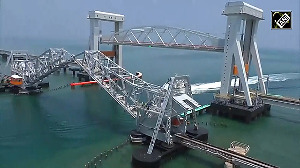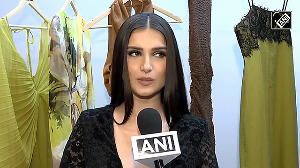Had penicillin been available in India in the late 1940s, Mahatma Gandhi's wife Kasturba Gandhi would have lived longer.
Alexander Fleming invented penicillin in 1928, but it was unheard of in India even two decades later when Kasturba was on her death-bed.
S Chandrasekaran, controller general of patents, designs, trademarks and geographical indications, does not want anyone to meet Kasturba's fate.
The 56-year-old engineer's one-point agenda is to ensure that every invention that is good for mankind is available in the country.
His one-line message to all Indian companies and multinationals and the community of scientists is: "Come with your product and I will protect you from unscrupulous practices."
Born and brought up in Chennai, Chandrasekaran is working hard to implement measures to reduce the lengthy bureaucratic process of patent registration.
The patent offices across the country are being fully computerised and over 200 examiners -- those who are responsible for examining the authenticity of a patent claim -- have already been recruited while another 90 are waiting in wings.
Chandrasekaran says his office is equipped to approve a patent with a minimum time-frame of five months. However, if the compliances are not met, a patent application may take as long as 52 months to get cleared.
He cannot, however, afford to be complacent simply because the patent applications are piling up. The latest figure indicates that nearly 11,000 applications have been submitted to four regional offices -- Chennai, Kolkata, Mumbai and Delhi.
He admits that there is room for improvement, especially in infrastructure. "The commerce and industry ministry is taking the issue seriously. We are trying to scale up our efficiency in every aspect," he says.
The patent offices of Delhi and Mumbai will soon be shifted to spacious buildings, indicating the seriousness with which the government is dealing with the issue.
His colleagues believe that the government has entrusted the right person with this challenging task. Says an executive of the patent office, Mumbai, "He knows the problems with all the regional offices because he worked in every office in different capacities."
Indeed, he has risen from the ranks.
Barring a short nine-month stint in two companies after he graduated from P H College of Technology in Coimbatore, Chandrasekharan has worked in the patents office all his working life.
His tryst with the patent office started as an examiner but his ambition was always to head.
And he prepared himself for the assignment. First, he took a law degree, then a doctorate degree in financial management, and finally became a Fellow of the Institution of Valuers.
In 1985, he was promoted to the position of assistant controller of patents and science.
It was promotion to the post of controller general that he records as the happiest moment of his life. "I joined at the lowest cadre of the department in 1974. Since then, I nurtured a dream of heading the department. In September last year, when I was told about the promotion, I was on cloud nine," is his candid comment.
When it comes to patents, Chandrasekaran is a reservoir of experience. He has travelled the globe either attending lectures or delivering them.
He delivered 300 lectures at different international forums at Stockholm, Tokyo, London, Munich, Vienna, Geneva, Seoul, Osaka and Kuala Lumpur.
Not that he lets this schedule interfere with his family life. He tries never to miss taking his wife, son and daughter on holiday once a year.
Chandrasekharan wants to be remembered as "an officer who took care of his colleagues". No wonder he felt elated when his stenographer was promoted this year. "Her promotion was long overdue. I feel satisfied that she got it at last," he says.






 © 2025
© 2025